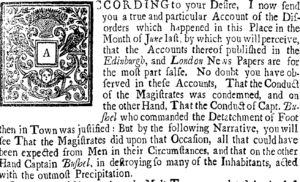Daniel Campbell (died 1753) facts for kids
Daniel Campbell (born around 1671 – died 1753) was a Scottish businessman and politician. He was known as "Great Daniel" because he was a big man and had a lot of money. He was a member of the British Parliament for the area of Clyde Burghs from 1716 to 1734.
Contents
Early Life and Dates
Daniel Campbell was the oldest son of Walter Campbell of Skipnish. He was born around 1671. Sometimes, old books might say he was born in 1696 or died in 1777. These dates actually belong to his son, John Campbell, and his grandson, Daniel Campbell.
Successful Merchant
When he was about 22 years old, Daniel Campbell started his own business in New England. Later, he moved to Glasgow, Scotland. There, he traded things like tobacco for iron ore. He was also involved in other types of business, including finance and the historical practice of transporting people for labor, which was a common but deeply problematic part of the economy in his time. He became very successful and wealthy. In 1707, he bought a large estate called Shawfield in Rutherglen. He also owned another valuable estate called Woodhall, near Holytown.
Becoming a Member of Parliament
Daniel Campbell was a supporter of the Duke of Argyll. He represented the area of Inveraray in the Scottish Parliament from 1702 until Scotland and England joined together in 1707. He was one of the people who signed the treaty that created Great Britain. He also served in the very first Parliament of Great Britain from 1707 to 1708. Later, he represented the Glasgow burghs in Parliament from 1716 to 1734. In 1711, he built a grand house in Glasgow called Shawfield Mansion. This house later became famous because of the Shawfield riots in 1725.
The Shawfield Riots and Buying Islay
Daniel Campbell had voted in Parliament to put a tax on malt (a type of grain used to make beer) in Scotland. Many people in Scotland were very unhappy about this tax. Because of his vote, a large crowd in Glasgow protested. They stopped tax collectors from doing their job. Then, the crowd went to Shawfield Mansion, Daniel Campbell's house, and completely destroyed the inside.
The local leaders of Glasgow were arrested because people thought they had supported the crowd. Daniel Campbell received £9,000 from the city of Glasgow as payment for the damage to his house. This was a very large sum of money at the time. Soon after, he used a big part of this money to buy the island of Islay.
His Family
Daniel Campbell passed away on June 8, 1753, when he was 82 years old. He had three sons and three daughters with his first wife, Margaret Leckie. All his sons died before him. After Margaret passed away in 1711, he married Katherine Erskine in 1714 and had another daughter.
When Daniel Campbell died, his grandson, also named Daniel Campbell (born around 1737), inherited his estates of Shawfield and Islay. This younger Daniel was only 16 when he became the owner. He continued to manage the estates until his death in 1777. Another grandson, Walter Campbell of Shawfield, later inherited the island of Islay and worked to improve it. The Campbell family was known for working hard to improve education, religion, farming, and other areas on their lands.
Biography
A book about Daniel Campbell's life, called A very canny Scot, was written by Joanna Hill and Nicholas Bastin. It was published in 2007.
 | Anna J. Cooper |
 | Mary McLeod Bethune |
 | Lillie Mae Bradford |


